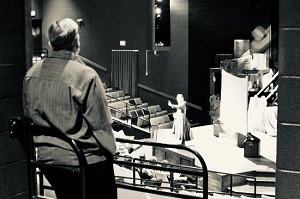
A Rumination about Pancakes & Eggs (Greek Gods in a Diner) my first Zoom reading which happened during my first pandemic.
My last project involved co-producing a series of online shows for the Kenworthy Performing Arts Centre which the pandemic has forced to go dark. The first production was a reading of Pancakes & Eggs (Greek Gods in a Diner) by Kendra Phillips, a University of Idaho MFA candidate. Below are a few thoughts about the story. The series was done within a month and each show allotted a week from casting to editing the Zoom recording for uploading. Thus, there was never time to explore these ruminations as far as I might have liked.
Pancakes & Eggs is about two gods and a mortal waitress held in a liminal space which resembles a diner. The diner is imagined by the waitress, Jill but she doesn’t appear aware that she created the world they inhabit. The gods are Aphrodite, love made manifest, and Apollo, representing the sun, music, medicine, etc., etc.—Apollo always seemed to have more work to do than the majority of the gods in the Greek pantheon.

Jill has trapped the gods and is generally disinterested in them. She knows who they are, calling them “sunshine” and “love”—a fun turn on pet names used by strangers to imply a false sense of familiarity. These pet names can be heard in exchanges waitstaff have with customers to put them at ease.
Diners in general are familiar/unfamiliar locations, designed to provide the culinary comforts of home for travelers. In Jill’s diner, breakfast is always available but there is no dessert. Also, another unique feature to this eating establishment: there is no way to leave. The immortals are held captive while they reckon with their appetites, love, and Jill.
At the beginning, Apollo brings a curse down that sounds as if Jill herself is speaking, lashing out at the heartache she’s suffered. When she discovers Apollo standing on the table meting out this curse, she tears his toga off, denying his godlike status and reducing him to mortal attire. During her stay, Aphrodite’s toga also gives, revealing modern dress.
Apollo realizes that his powers are waning. It began after shooting Achilles during the Trojan War.
I should add here that there are a variety of variations on Greek myths even when the stories were originally being told. The Greek poets would also alter the myths for their plays. The story of the three golden apples (also in this play) is considered a "filler" myth. It bridges the gap between legends. Talking with my friend, retired classics professor CAE Luschnig, I learned that Aphrodite and Apollo are rarely romantically linked in myth as seen here. Creating a fun and rarely seen variation in the pantheon. Kendra pulls on that tradition to tell her own myth about Apollo and Aphrodite to serve the larger story of the play.
So, Apollo shot Achilles and has felt drained since. His arrow is reduced to a stick. His power of prophecy has left him.
Aphrodite arrives, and Apollo invites her to join him for breakfast. She is arrogant and shut off, manifestations that she is not feeling herself. Aphrodite finds the breakfast Jill brings unsuitable for gods.
Visitors to diners often encounter foods they are unfamiliar with. In Aphrodite’s case, she gets eggs which she did not ask for. Apollo has never had pancakes but waits for syrup before deciding if he likes it. Both of them discover their food is cold. Jill scolds them for waiting too long.
Both immortals are involved in propagating the future, but Jill doesn’t give them anything viable to work with. Apollo’s leavened pancakes are cold as are Aphrodite eggs.
Despite Jill’s brusque demeanor, Apollo finds himself drawn in. Aphrodite is repelled by her. She is shut off from the creator of the environment they now inhabit. Jill did this in part to protect herself from the heartbreak of her husband leaving. The blocking has caused the embodiment of love to physically wilt. She has been walled off from everything love needs which is love.
Heedless of what Aphrodite is going through, Apollo persuades her to woo Jill on his behalf. Her efforts are ridiculous and leaden in her weakened state which is exacerbated by Jill’s walling off of love.
Alongside the action of the play is an examination of love and its role in our lives. What purpose, if any, does it serve? Is it a reward (dessert) unto itself? And when it, for whatever reason, doesn’t play out love becomes service. This is illustrated with Jill’s wedding gown and the hopes and dreams it engendered now turned to working attire.
JILL: (JILL looks at her waitress uniform) This was my wedding dress.
Aphrodite continually defines and refines what love is her identity and role in it. And ultimately, the audience comes to discover Jill’s heartache and her self-inflicted punishment is caused by her lover’s departure. She thinks Aphrodite is punishing her and doesn’t realize she has forgotten her husband, her heartache, and created the diner as a shelter. Aphrodite declares her beyond help. This pronouncement dooms Jill to the diner her mind has created.
But Jill’s tribulations fade into the background when the two immortals discover that for this long while they have been in love with each other. They are drawn into each other’s need of love, to give love, and to be loved. Leaving Jill to rediscover her heartache is strangely enough beneficial for all of them. She is able to recover her missing memories—if only briefly. And the immortals finally recognize their passion for each other which is the only way they can escape the liminal space Jill has created.
With order restored, Jill changes her policy and brings dessert to see them off but takes none herself. She doesn’t like sweet things. And as the new lovers depart, she returns to where we found her in the beginning.